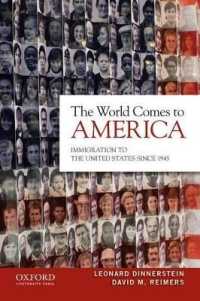- ホーム
- > 洋書
- > 英文書
- > Politics / International Relations
Full Description
This third edition of Politics in India provides a timely counter-narrative to pessimistic prognoses about the future of Indian democracy. It focuses on the resilience of India's democratic political system and its strategic reorientation in response to electoral mandates emerging from the country's vigorously competitive elections.
In a comprehensive analysis of the country's democratic processes, Mitra brings together political theory and historical perspective in order to provide a comparative analysis and interpretation of issues that have occupied the Indian state since Independence from British colonial rule in 1947. Based on the rationality of the Indian voter and the strategic acumen of the political leaders, this is the first comprehensive explanation of how India has achieved a seamless transition from colonial rule to a robust and resilient democracy. Mitra explains how India has sought to balance development with social justice, consent with force, and pursue strategic autonomy in the global arena. As a result, the book demonstrates that, despite the periodic breakdown of democratic governance, the political process consistently restores the dynamic equilibrium of the system. The chapters, cross-referenced, can be read both as stand-alone essays on specific themes, as well as parts of a single narrative.
Supplemented with tables, boxes, illustrations, and comprehensive notes on further reading, the new edition will continue to be an essential reading for students and researchers in Indian and South Asian studies, introduction to political science and world politics, development studies, sociology, comparative politics, and political theory. General readers interested in how the world's most populous democracy functions on a day-to-day basis may find the volume a useful introduction to Indian politics.
Contents
PART I: Introduction
1 Indian politics in the twenty‑first century: democracy, diversity, and governance
2 Culture, context, and the rational voter: the 'idioms' of Indian politics
PART II: History, society, and identity
3 The past in the making of the present: the longue durée of Indian politics
4 Caste, language, and religion: politics and social cleavages in India
5 Nationising India: politics in quest of a collective identity
PART III: Government and the political process
6 Strength with accountability: the institutional arrangement of the Indian state
7 India's symmetric and asymmetric federalism: balancing national unity and regional autonomy
8 Elections and political parties: democracy's workhorses
9 Radical politics, 'demand groups' and consolidation of democratic governance
10 Force in the making of legitimacy: the keepers of order, and the consolidation of Indian democracy
PART IV: Economy, social justice, and India's global outreach
11 The state and the economy: the challenge of democracy and development
12 The state and social justice: poverty, social vulnerability, and welfare
13 India and the world: statecraft and foreign policy
PART V: Conclusion: consolidating democratic governance
14 The resilience of India's counterfactual democracy, and its anomalies
15 Consolidating democratic governance in India: prospects and problems








